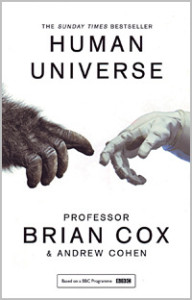Human Universe
by Brian Cox & Andrew Cohen
Published by William Collins www.williamcollinsbooks.com
This is a book of big questions – why are we here, are we alone, what is our future, is that a real gorilla hand on the cover or just a guy in a suit? Well, maybe not that last one but in ‘Human Universe’, regular TV science pundit Brian Cox and head of the BBC science unit Andrew Cohen, do address the big questions – you can tell they’re big questions, they’re in BIG print – and try to provide big answers
Each of five big questions gets it’s own section which the authors use as a springboard to delve into the best answers astronomy, evolution, biology and physics have to offer. Incidentally, those five sections are all you get for a contents page – a massive oversight that makes re-reading exasperating and is a complete pain in the arse for reviewers.
Based on the BBC TV documentary of the same name, ‘Human Universe’ is a useful summary of the current state of several scientific disciplines and serves as a convenient refresher for those of us who accumulated our popular science ‘education’ before Pluto stopped being a planet (the Universe is 91 billion light years across now? Did I miss a memo?) but, in all honesty, the book doesn’t contain much that you could really classify as ‘new’ science so I was in two minds about including it here. However, this column is as much ‘recommended reading’ as ‘review’ and there are two significant reasons which swayed me. One is that books are generally better than TV as you can proceed at your own pace (I tend to listen faster than presenters talk) and can go into considerably more depth than a TV show. However, the main reason I have for recommending it is simply this; joy.
The book is infused with a joie de vivre or perhaps joie de découverte would be more accurate. Cox is an excellent science communicator, effectively a British Carl Sagan. He may not quite have Sagan’s eloquence but his love for science, for the process of discovery, the peeling back of the curtain of mystery to reveal the wonder and intricacy of the universe, seems just as strong. Whether it’s recounting Giordano Bruno’s fight with the Church, chatting with Apollo astronaut Charlie Duke or racing across the frozen Kazak steppe to catch a Soyuz landing, Cox’s enthusiasm is clear and infectious.
He weaves snippets of his personal path to science into the wider picture too, showing that science –the art and practice of discovery – is not performed by remote, anonymous white-coated men and women. It’s done by ordinary kids who grow up in ordinary homes in ordinary places like Oldham who become ordinary physics professors at ordinary Large Hadron Colliders.
Cox, famously, played keyboards for the band D:Ream in the 90’s before completing his PhD (a curious mirror-image career path to Queen’s Brian May) and it’s clear that art and science are, for him, complimentary rather than competing systems of experiencing the world. The pages here are peppered with relevant quotes. Not just from the expected science luminaries like Einstein and Hubble but Shakespeare, Milton, Lennon and Kipling too. There’s even some musicians – well, ‘Joy Division’ actually but I’ll let that one slide as a matter of personal taste.
‘Human Universe’ isn’t on any school curriculum (or many parent’s shelves) but it should be. In a world that spends more on footballer’s salaries than research, the book’s clear ‘this is where we are’, ‘this is how we got here’, ‘this is where we need to go’ message is a much needed solid and optimistic grounding in the what, how and why of our species’ place in the universe. I don’t know if these are the answers you want but they are the answers we need.
